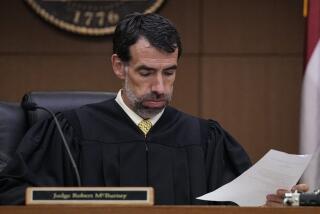Supreme Court Bars Drug Tests for Political Candidates
WASHINGTON — Reversing course, the Supreme Court for the first time struck down a forced drug-testing program Tuesday, ruling that Georgia violated the 4th Amendment by requiring political candidates to undergo tests for purely symbolic purposes.
While Georgia is the only state to pass such a law, the court’s opinion voiding it is expected to have a broad impact in limiting the government’s use of drug testing to situations involving public safety.
Until Tuesday, the high court had consistently upheld mandatory drug testing in cases involving railroad workers, customs agents, police officers and even high school athletes. The series of rulings had suggested that so long as officials foresaw a potential drug problem, mandatory testing was permitted.
But the 8-1 opinion in the Georgia case draws a line against this invasion of a person’s privacy except when public safety is threatened.
“Where the risk to public safety is real and substantial,” mandatory testing “may be reasonable,” wrote Justice Ruth Bader Ginsburg. “But where, as in this case, public safety is not genuinely jeopardized, the 4th Amendment precludes the suspicionless search, no matter how conveniently arranged.”
Drug testing cannot be justified for “a symbol’s sake” or to further an “image” of a drug-free workplace, she said.
The ruling almost surely dooms a proposal by some House Republicans to require drug testing of all Capitol Hill staff members. The idea, floated in January, was touted as a means of sending a message that drug use was not tolerated.
It also cast doubt on a White House policy requiring employees there to submit to drug tests. By coincidence, that policy was upheld by a lower court on the same day the high court struck down the Georgia law.
Tuesday’s ruling has no direct impact on private employees, however. The 4th Amendment only bars “unreasonable searches and seizures” by the government.
Nonetheless, Ginsburg’s opinion breathes new life into a constitutional protection that has shrunken in significance during the “war on the drugs.”
During the 1960s and ‘70s, the justices regularly invoked the principle that official searches could be triggered only by an “individualized suspicion of wrongdoing.” For example, police officers normally could not stop a car or a pedestrian without some reason to suspect the motorist or pedestrian of violating the law.
But by the late 1980s, the justices began to set aside that rule and to uphold mass searches without regard to evidence of whether an individual did anything wrong. For example, the justices approved routine searches of passengers on intercity buses and trains and “sobriety roadblocks” on the highways.
In 1989, the court ruled mandatory drug testing of customs agents and railroad workers was constitutional and cited the precedents involving mass searches.
In Tuesday’s opinion, Ginsburg reverted to the older rule, insisting officials could not invade an individual’s privacy unless there was “a concrete danger” to the public and a “special need” for the testing.
“However well meant, the candidate drug test Georgia has devised diminishes personal privacy for a symbol’s sake,” Ginsburg said. “The 4th Amendment shields society against that state action.”
Appropriately enough, a Libertarian candidate complained about the mandatory test and filed a lawsuit to challenge it.
Only Chief Justice William H. Rehnquist dissented in Chandler vs. Miller, 96-126. The law “may seem misguided or even silly to members of this court,” he wrote, but “it would take a bolder person than I to say that such widespread drug use could never extend to candidates for public office such as governor of Georgia.”
More to Read
Get the L.A. Times Politics newsletter
Deeply reported insights into legislation, politics and policy from Sacramento, Washington and beyond. In your inbox three times per week.
You may occasionally receive promotional content from the Los Angeles Times.











